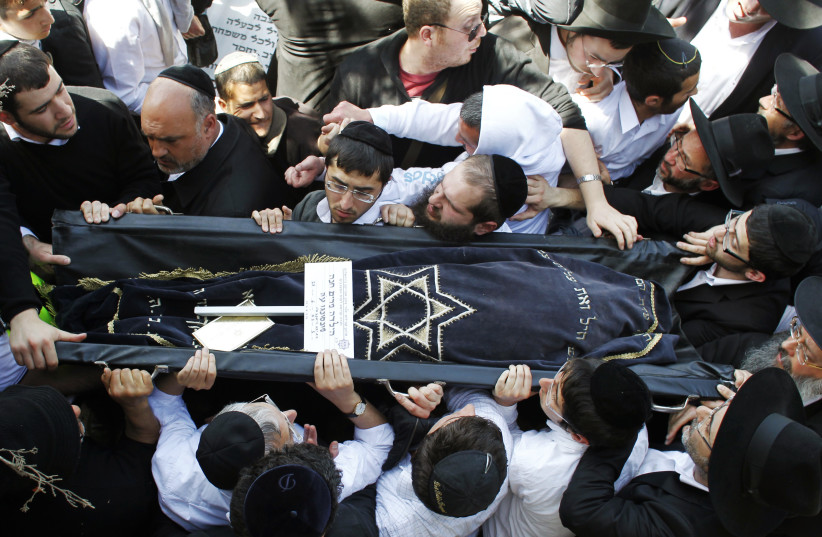by Colin Shindler
Book: The European Left and the Jewish Question 1848-1992
 |
Carrying the body of Miriam Monsonego during a joint Jerusalem
funeral for four victims of the 2012 terror murders in Toulouse, France
(photo credit: NIR ELIAS/REUTERS)
|
This book of accessible essays by specialists examines the Jewish
question, not internally from the perspective of Jews themselves, but
externally by European socialist thinkers.
Since
Zionism was a singular ideology and did not fit into accepted theory,
many socialists such as Lenin dismissed it out of hand. This did not
always imply antisemitism but more a blind and political rejection of
Zionist ideology.
In
this detailed tome, French historian Michel Dreyfus pinpoints the
affair of his namesake, Alfred Dreyfus, in the early 20th century as a
turning point in the relationship between the Left and the Jews. He
lists five different forms of antisemitism on the Left. He interestingly
describes how pacifism in the 1930s – as a reaction to the slaughter in
the trenches during World War I – became “a vector of antisemitism.”
In those pre-Shoah
days, Jews were seen by some pacifists as pushing for and provoking a
war with Hitler. The fires of antisemitism were further stoked when Léon
Blum, a Jewish socialist and supporter of Zionism, became prime
minister of France.
Andrea
Pinazzi dissects the views of Antonio Gramsci, the well-known Italian
socialist theorist, on the Jewish question through his letters to his
sister-in-law. Gramsci comes over as profoundly superficial. He died in
Mussolini’s prisons in 1937 just before anti-Jewish legislation was
introduced in Italy. Would this have changed Gramsci’s views if he had
lived?
Another
scholar, Marta Nicolo, contrasts Gramsci with the figure of the Jewish
Communist Umberto Terracini, who spent 11 years in Mussolini’s prisons
and another six in confinement. Yet he opposed the Nazi-Soviet pact,
pushed for recognition of Israel in the Italian Parliament in 1948,
condemned Saddam’s hanging of Iraqi Jews in 1969 and was a very early
campaigner for the emigration of Soviet Jews. And Terracini remained a
loyal Communist.
The
last part of this book is devoted to “the Israel Question” and covers
familiar topics. Gregorio Sorgonà however breaks new ground in
describing the influence of Mao’s China on the New Left in the 1960s.
After the Soviet-Chinese schism, Beijing regarded both the USSR and the
US as imperialist. Mao deemed the Middle East as fertile territory for a
new anti-imperialist struggle after Vietnam. Beijing’s Italian
followers viewed Fatah as “para-fascist” and only the Democratic Front
for the Liberation of Palestine as truly “revolutionary.”
As
many writers in this book indicate, the Left was never monolithic, but
just too many of its component parts were remarkably limited when it
came to the Jewish question. Lenin was ignorant of the suffering of the
Jewish masses in Tsarist Russia and knew nothing about the socialist
Zionism of figures such as Moses Hess, Nachman Syrkin and Ber Borochov.
Lenin’s indifference however was superseded by Stalin’s ingrained
antisemitism and his chosen instrument of slow death, the Gulag
Archipelago.
The early writings of Karl Marx are still seen by many as exuding
“a contempt for the Jews.” This cemented the link between Jewish
landlords and speculators for succeeding generations such as the German
New Left a hundred years later. Hartwig von Hundt-Radowsky, was the
first to call for the extermination of the Jews in 1819 – just a few
years after the defeat of Napoleon at Waterloo.
Pierre-Joseph
Proudhon, the French socialist philosopher, a 19th century contemporary
of Marx, was unapologetically antisemitic. In Russia, Trotsky embraced
assimilationism and proclaimed during the October Revolution in 1917
that “I am not a Jew. I am an internationalist.” In French exile many
years later, the scales dropped from Trotsky’s eyes and he strongly
protested against rising antisemitism and regarded the Jews as a nation.
As
several contributors to this book remark, socialism took on the form of
a quasi-religion. Belief rather than analysis became the centerpiece of
endeavor. For many, Jews simply did not count when it came to
discrimination. So when the Soviet show trials took place in the 1930s,
many on the Left, including critics of Stalin, preferred to look away
when anti-Jewish themes pervaded the courtroom.
Several
authors highlight external factors that have influenced groups on the
Left. The Spanish Left imbibed ideas at the altar of historical
anti-Judaism during the Inquisition. The Christian Left promoted the
vision of a Jesus who identified with the poor – and thereby with the
Palestinian refugees.
In
France during the 1950s, many embraced anti-colonialism and supported
the National Liberation Front’s struggle for independence in Algeria –
and warmed to Nasser’s backing for it. Decolonization during the 1960s
allowed the New Left in Europe to identify more with the nascent
Palestinian national movement than with the Israeli one – and this was
before the West Bank settlement drive.
In
an effort to express solidarity with discriminated Muslim minorities in
Europe, some on the French Left maintain a mistaken silence about the
reactionary politics of the Islamists. And anti-Zionism sometimes tips
over into overt antisemitism. There were antisemitic killings in
Toulouse, Montauban and Vincennes in recent times. In 2006, Ilan Halimi
was killed because he was Jewish – the first antisemitic murder in
France since 1945.
This
volume is unusual because it goes into the origins of contemporary
antisemitism and anti-Zionism within the European Left in mainly France
and Italy. Pushing the slogans and clichés of campaigners against
antisemitism to one side, it looks at the roots of the problem today.
Its detailed explanations by scholars will certainly provide food for
thought for those who wish to deepen their knowledge.
Colin Shindler
Source: https://www.jpost.com/diaspora/antisemitism/article-690217
No comments:
Post a Comment